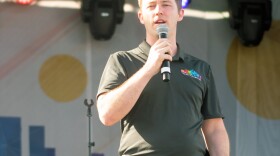Rebecca Grant was a Staff Sergeant in the Army National Guard. Twelve years into her military career, a fellow soldier found and circulated a picture of her wearing a dress. The Army took issue with the photo because she had enlisted and had been serving as male—the sex she was assigned at birth.
Rebecca is now the president of Sienna, a transgender social, educational and support group, and has come out as transgender and a lesbian. But embracing her identity hasn't been without challenges. "Right now, I'm able to still marry, let's say, my partner, a female, legally," she explains. "But once I have my sex change, I would not have that opportunity. And that seems completely wrong."
Rebecca Grant told WFPL's Phillip M. Bailey and Laura Ellis her story, starting with a different transition: from soldier to civilian.
On Language
"At Sienna, we look at the 'trans-asterisk.' Anyone who has any kind of gender variance. There are differences between cross dressers and transsexuals and there are people who just identify as transgender now. Then you have your entertainers, which is still a gender variance. If you have someone who is biologically male performing as a female, they're a drag queen. And it's a performance, but it's still types of gender expression."
On a Binary Model of Gender
"There's a boy who was born, and they get a blue blanket. There was a girl that was born, and they get a pink blanket. But it's not just that simple. There are indications that there are variations, within the womb, of gender. It's not just one or the other. It's a very wide in-between area."
On Growing Up
"Growing up in the '80s, that's when the height of the AIDS was coming around in society. It was very wrong to be LGBT. At home, my parents were really good. I was able to, to a point, dress like a girl. They didn't care. And, to a point, even cross dressing, or wearing clothes underneath my male clothes. Those that are are considered 'gender conforming,' they're able to go out to school when they're in their teens, and be judged by public opinion. Trans kids aren't able to do that as much. They have to hide it."
On Acceptance Within the Gay Community
"I go to more lesbian-type events. I don't want to say I haven't been accepted, but it took me a little longer to be accepted into the lesbian community. When I was coming out, when I was outed, my largest support was actually in the gay community. And I think for the most part I already was accepted there. When I started feeling more confident about myself, and dressing more as a female, I was able to gain friends, and most of the time it was gay males."
On Trans Issues Being Put on the Back Burner
"I believe that is getting better. We're not being pushed to the back as much. There are more trans people that are having a voice towards the fight. More trans people are being able to be out of the closet, because society is getting better as a whole. And we're able to speak more about the issues at hand, and not just hide in the closet and hope that our, usually gay, part of the organization stands up for us."





